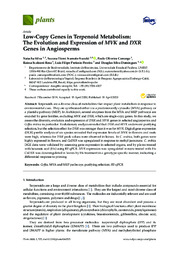Low-copy genes in terpenoid metabolism: the evolution and expression of MVK and DXR genes in angiosperms.
Low-copy genes in terpenoid metabolism: the evolution and expression of MVK and DXR genes in angiosperms.
Author(s): SILVA, N.; IVAMOTO-SUZUKI, S. T.; CAMARGO, P. O.; ROSA, R. S.; PEREIRA, L. F. P.; DOMINGUES, D. S.
Summary: Terpenoids are a diverse class of metabolites that impact plant metabolism in response to environmental cues. They are synthesized either via a predominantly cytosolic (MVA) pathway or a plastidic pathway (MEP). In Arabidopsis, several enzymes from the MVA and MEP pathways are encoded by gene families, excluding MVK and DXR, which are single-copy genes. In this study, we assess the diversity, evolution and expression of DXR and MVK genes in selected angiosperms and Coffea arabica in particular. Evolutionary analysis revealed that DXR and MVK underwent purifying selection, but the selection effect for DXR was stronger than it was for MVK. Digital gene expression (DGE) profile analysis of six species revealed that expression levels of MVK in flowers and roots were high, whereas for DXR peak values were observed in leaves. In C. arabica, both genes were highly expressed in flowers, and CaDXR was upregulated in response to methyl jasmonate. C. arabica DGE data were validated by assessing gene expression in selected organs, and by plants treated with hexanoic acid (Hx) using RT-qPCR. MVK expression was upregulated in roots treated with Hx. CaDXR was downregulated in leaves by Hx treatment in a genotype-specific manner, indicating a differential response to priming.
Publication year: 2020
Types of publication: Journal article
Unit: Embrapa Coffee
Keywords: Angiospermae, Coffea arabica var. arabica, Genes, Terpenoids
Observation
Some of Embrapa's publications are published as ePub files. To read them, use or download one of the following free software options to your computer or mobile device. Android: Google Play Books; IOS: iBooks; Windows and Linux: Calibre.
Access other publications
Access the Agricultural Research Database (BDPA) to consult Embrapa's full library collection and records.
Visit Embrapa Bookstore to purchase books and other publications sold by Embrapa.

